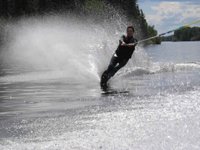Canadian Living; Caine and Caine
Canadian Living discusses the functioning of teenage brains - and accurately:
The Canadian Living (August, 2006) has an article called "Your teenager: An owner's manual". I read the print version but the same article is on-line. The interesting thing about this article is that it seems to be summarizing a few of the things I am reading in my neuroscientific research books. I feel like I am looking at the world through different lenses. How much neuroscience has already infiltrated society but we just haven't named it as such?
Where did I find these glasses?
I am still reading the book by Caine and Caine (1991) that I discussed yesterday.
"If we want students to use their brains more fully, we have to teach for meaningfullness" (p. 91). A story is given to underline this point...
"Two stonecutters...were engaged in similar activity. Asked what they were doing, one answered, 'I'm squaring up this block of stone.' The other replied, 'I'm building a cathedral' " (p. 91).
Instead of teaching "stuff" that merely needs to be memorized, we need to teach for deeper understanding...meaningfullness. Caine and Caine (1991) compare rote learning to locating important places by memorizing the route. They suggest that there are times this is important but more often we should be teaching them how to navigate using a map. "Maps are a frame of reference" (p. 46).
I like these images.
Technology changes so much. Yet the possilibity is there for technology to change little. Will we use technology to continue teaching routes or will we use technology to create map readers?
The book concludes on a positive and missional manner...
"Change, of course, takes time". Note: The book was written in 1991!! "All learning is developmental, including the learning of educators. Many of the changes that are needed will also appear in unexpected ways and from unpredictable sources. Some of the most unlikely people will become the most valuable colleagues and collaborators....Setting out to participate in the change is exciting, challenging, and immensely rewarding" (p. 180).
And the concluding quote:
"From this hour I ordain myself loos'd of limits and imaginary lines,
...Listening to others, considering well what they say,
Pausing, searching, receiving, contemplating,
Gently, but with undeniable will divesting myself of the holds that would hold me."
(Walt Whitman, "Song of the Open Road," Leaves of Grass, [1892] 1958)
The Canadian Living (August, 2006) has an article called "Your teenager: An owner's manual". I read the print version but the same article is on-line. The interesting thing about this article is that it seems to be summarizing a few of the things I am reading in my neuroscientific research books. I feel like I am looking at the world through different lenses. How much neuroscience has already infiltrated society but we just haven't named it as such?
Where did I find these glasses?
I am still reading the book by Caine and Caine (1991) that I discussed yesterday.
"If we want students to use their brains more fully, we have to teach for meaningfullness" (p. 91). A story is given to underline this point...
"Two stonecutters...were engaged in similar activity. Asked what they were doing, one answered, 'I'm squaring up this block of stone.' The other replied, 'I'm building a cathedral' " (p. 91).
Instead of teaching "stuff" that merely needs to be memorized, we need to teach for deeper understanding...meaningfullness. Caine and Caine (1991) compare rote learning to locating important places by memorizing the route. They suggest that there are times this is important but more often we should be teaching them how to navigate using a map. "Maps are a frame of reference" (p. 46).
I like these images.
Technology changes so much. Yet the possilibity is there for technology to change little. Will we use technology to continue teaching routes or will we use technology to create map readers?
The book concludes on a positive and missional manner...
"Change, of course, takes time". Note: The book was written in 1991!! "All learning is developmental, including the learning of educators. Many of the changes that are needed will also appear in unexpected ways and from unpredictable sources. Some of the most unlikely people will become the most valuable colleagues and collaborators....Setting out to participate in the change is exciting, challenging, and immensely rewarding" (p. 180).
And the concluding quote:
"From this hour I ordain myself loos'd of limits and imaginary lines,
...Listening to others, considering well what they say,
Pausing, searching, receiving, contemplating,
Gently, but with undeniable will divesting myself of the holds that would hold me."
(Walt Whitman, "Song of the Open Road," Leaves of Grass, [1892] 1958)

 .
.
